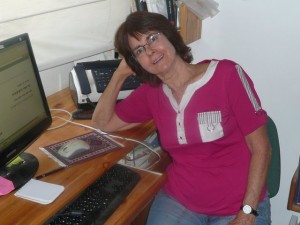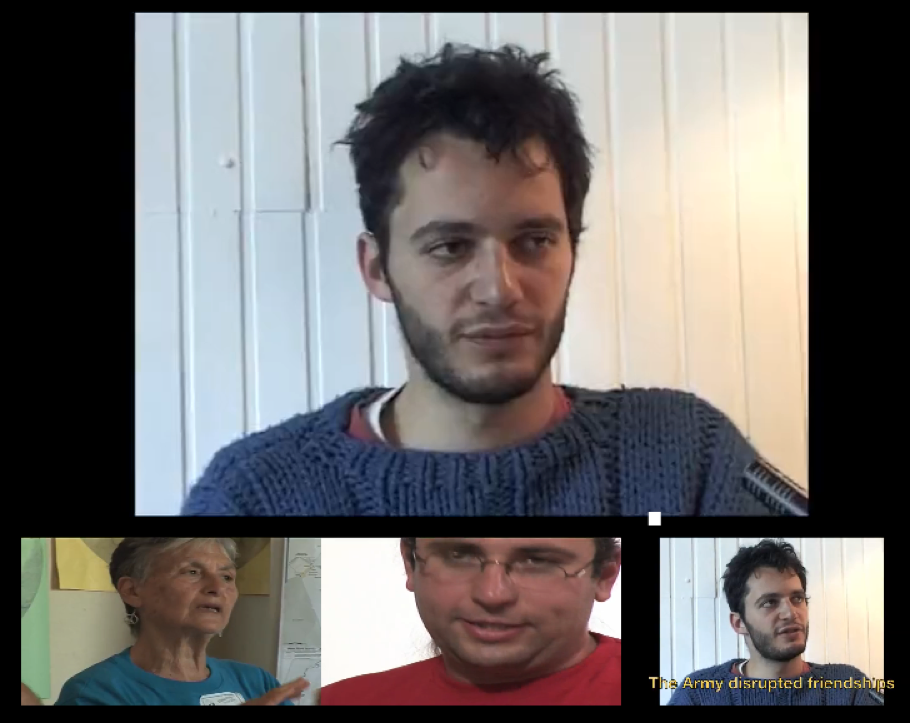The Only Democracy? » Human Rights Activists in the Crosshairs, On The Ground Reports » Civil Disobedience Is….A Fun Day Out in Tel Aviv
Civil Disobedience Is….A Fun Day Out in Tel Aviv
By the Coalition of Women for Peace
The trip to the Betar crossing point passed in almost complete silence. When we approached the checkpoint, the red sign, the metal tower, the speed bumps, the concrete barriers, the soldiers’ position, I felt my legs shaking – and not because of the bumpy road. I took a deep breath, slowed down but didn’t stop, rolled down the window, gave the soldier a causal wave and he indifferently motioned for me to keep going. ‘We made it!’” (Ilana Hammerman, “If There Is a Heaven,” Ha’aretz, 7 May 2010)
One spring morning, not so long ago, four women crossed the Betar Checkpoint: Ilana Hammerman, an Israeli translator and editor, and three Palestinian girls from a village in the West Bank. The girls, Aya, Lin and Yasmin – who because of their young age have not lived one day free of occupation – went with Ilana for a fun day in Tel Aviv. They visited the museum, the mall and the market, dipped in the sea, ate ice cream on a bench in the boulevard and when the evening came they crossed the checkpoint again to return to their homes. Hammerman tells this optimistic tale in her article, “If There Is a Heaven.”
But these simple and optimistic activities have turned the four women into criminals according to Israeli law. An organization called “The Legal Forum for the Land of Israel” asked the Attorney General to open a criminal investigation against Hammerman for violating the “Law of Entry to Israel” – which states that anyone who drives, hosts or in any other way assists a Palestinian’s entry to Israel shall be sentenced to two years in prison or fined.
In a public act of civil disobedience, Ilana Hammerman has pointed to one of the basic components of the Israeli occupation regime: the law. Dozens of laws and regulations, civil and military, define and dictate every detail in the lives of Palestinians in the Occupied Territories: Where they go and how they will get there, how they will work, where they will live and with whom they can share their lives. Most of these rules and regulations violate international law, Israeli basic laws, as well as human empathy and logic, and Ilana was right in choosing to violate them. Ilana’s actions undermine the legitimacy of the ongoing control of millions of people by a “democratic” rule they have no part in, and rejects the separation between Jews and Palestinians, which is one of the foundations of the occupation regime. It is an act of necessary defiance in the face of an unbearable reality.
What is the red line beyond which we can no longer continue to respect its laws and regulations without betraying our conscience, which requires us, just as the Basic Law of our country says, ‘to defend human dignity and liberty’ – that is, the human dignity and liberty of every person, and not just the Jewish or Israeli person?” (Ilana Hammerman, “In Defense of Dignity and Freedom,” Ha’aretz, June 10 2010)
If and when she is put on trial, Ilana will refuse her right to an attorney. She wants to raise awareness and to generate a public discourse in Israel and abroad – on questions of the occupation, blind obedience and situations where obeying the law constitutes betraying one’s conscience and the human spirit. “I did not do this in rash defiance,” she writes, “but rather after much thought. Out of a need, that has become ever more pressing in the last years, to raise certain essential issues for in-depth public discussion in Israeli society.”
“The end was wonderful. The last photos show them about two hours after the trip to the flea market, running in the darkness on Tel Aviv’s Banana Beach. They didn’t want to stop for even a minute at the restaurant there to have a bite to eat or something to drink, or even to just relax a bit. Instead they immediately removed their sandals again, rolled up their pants and ran into the water. And ran and ran, back and forth, in zig-zags, along the huge beach, ponytails flying in the wind. From time to time, they knelt down in the sand or crowded together in the shallow water to have their picture taken. The final photo shows two of them standing in the water, arms around each others’ waists, their backs to the camera. Only the bright color of their shirts contrasting with the dark water and the sky reveals that the two are Yasmin and Aya, because Lin was wearing a black shirt.” (Ilana Hammerman, “If There Is a Heaven”).
——————-
Join the Facebook page in support of Hammerman’s civil disobedience
Coalition of Women for Peace website
Filed under: Human Rights Activists in the Crosshairs, On The Ground Reports










 “You have a choice! Israeli Anti-Militarists Speak”
“You have a choice! Israeli Anti-Militarists Speak”